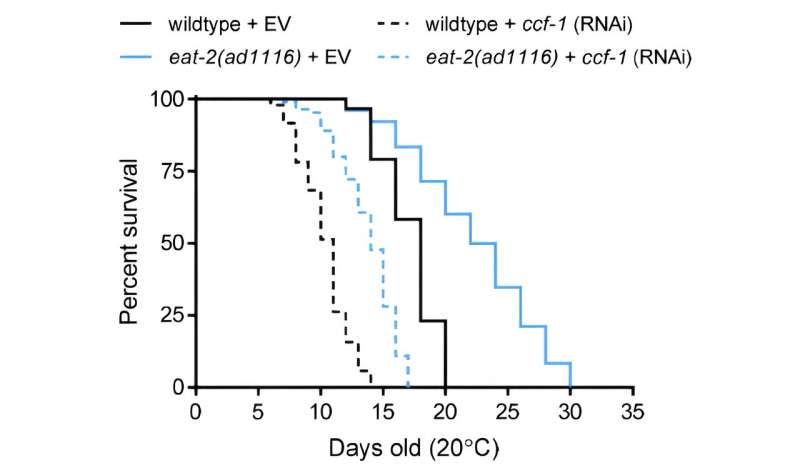This article has been reviewed according to Science X's editorial process and policies. Editors have highlighted the following attributes while ensuring the content's credibility:
fact-checked
proofread
CCR4-NOT complex in stress resistance and longevity in C. elegans

A new editorial paper titled "CCR4-NOT complex in stress resistance and longevity in C. elegans" has been published in Aging.
The ability to mount an adaptive response to environmental stress is crucial in organismal survival and overall fitness. In the context of aging, many genes that mediate resistance to stressors are also important in longevity, and aging has been shown to cause a decline in stress resistance.
In their new editorial, researchers Cheng-Wei Wu and Hadi Tabarraei from the University of Saskatchewan wrote that recently, during a screening for genes that are required for the transcriptional response to heavy metal and oxidative stress in C. elegans, they found that depletion of subunits within the evolutionarily conserved CCR4-NOT protein complex compromises stress resistance and decreases lifespan.
"The CCR4-NOT (Carbon Catabolite Repression 4-Negative On TATA-less) is a multi-protein complex tasked with regulating RNA metabolism across multiple steps including mRNA decay, transcription initiation and elongation, mRNA quality control and export, and mRNA translatability," the researchers write.
Studies in yeast have shown that CCR4-NOT is required for transcriptional elongation of stress responsive genes and that loss of function mutants of this protein complex have increased sensitivity to replication stress caused by DNA damaging agents. An expansive role for the CCR4-NOT complex in stress-induced transcriptional programming was demonstrated in C. elegans via whole-transcriptome sequencing analysis.
"Together, while the CCR4-NOT complex has been extensively studied for the past three decades, new studies in the model organism C. elegans have revealed an important new role for this protein complex in regulating normal aging as well as a requirement for many well-characterized and evolutionarily conserved pro-longevity pathways including reduced insulin signaling, mitochondrial suppression, enhanced stress response, and dietary restriction," the researchers conclude.
More information: Cheng-Wei Wu et al, CCR4-NOT complex in stress resistance and longevity in C. elegans, Aging (2024). DOI: 10.18632/aging.205918




















